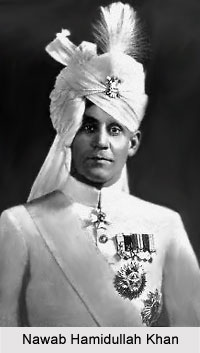 Nawab Hamidullah Khan, also known as Hajji Nawab Hafiz Muhammad Hamidullah Khan, was the last ruling Nawab of the princely state of Bhopal. At present, Bhopal is a part of Madhya Pradesh state, which was incorporated in the year 1956. The last Nawab Hamidullah Khan gave consent to merge his state with India in 1947. He ruled from the year 1926 when Begum Kaikhusrau Jahan Begum, his mother, renounced in his favor, until the year 1949. Hamidullah Khan held the ceremonious title until the year 1960, when he died. He was a delegate to the Round Table Conference in London and also served as Chancellor of the Chamber of Princes, during the period 1931- 1932 and again from 1944- 1947, when the country achieved independence. Nawab Hamidullah Khan of Bhopal actively participated in the World War II and was present at the Battle of El Alamein and the Battle of Keren. As he had no sons at the time of his death, Sajida Sultan, his second daughter, succeeded Hamidullah Khan and became Begum of Bhopal.
Nawab Hamidullah Khan, also known as Hajji Nawab Hafiz Muhammad Hamidullah Khan, was the last ruling Nawab of the princely state of Bhopal. At present, Bhopal is a part of Madhya Pradesh state, which was incorporated in the year 1956. The last Nawab Hamidullah Khan gave consent to merge his state with India in 1947. He ruled from the year 1926 when Begum Kaikhusrau Jahan Begum, his mother, renounced in his favor, until the year 1949. Hamidullah Khan held the ceremonious title until the year 1960, when he died. He was a delegate to the Round Table Conference in London and also served as Chancellor of the Chamber of Princes, during the period 1931- 1932 and again from 1944- 1947, when the country achieved independence. Nawab Hamidullah Khan of Bhopal actively participated in the World War II and was present at the Battle of El Alamein and the Battle of Keren. As he had no sons at the time of his death, Sajida Sultan, his second daughter, succeeded Hamidullah Khan and became Begum of Bhopal.
Personal Life of Nawab Hamidullah Khan
On September 5, 1905, Hajji Nawab Hafiz Muhammad Hamidullah Khan, Nawab of Bhopal, was married to Maimoona Sultan Shah Banu Begum Sahiba at Peshawar. She was the great-great-granddaughter of Shah Shuja of Afghanistan. The royal couple had 3 daughters-
* Nawabzadi Qamar-i-Taj Dulhan Rabia Sultan Begum Sahiba
* Sikander Saulat, Iftikhar ul-Mulk, Nawab Mehr-i-Taj Sajida Sultan Begum Sahiba, Nawab Begum of Dar ul-Iqbal-i-Bhopal
* Suraya Jah, Nawab Gowhar-i-Taj, Abida Sultan Begum Sahiba
Later in the year 1947, Hamidullah Khan was married for a second time to Aftab Jahan Begum Sahiba. The couple had no children.
Titles of Nawab Hamidullah Khan
Nawab Hamidullah Khan of Bhopal held numerous titles through out his reign. These are described below-
* Nawabzada Muhammad Hamidullah Khan Bahadur (1894- 1903)
* Hajji Nawabzada Muhammad Hamidullah Khan Bahadur (1903- 1907)
* Hajji Nawabzada Hafiz Muhammad Hamidullah Khan Bahadur (1907- 1921)
* Hajji Nawabzada Hafiz Muhammad Hamidullah Khan Bahadur, CSI (1921- 1922)
* Hajji Nawabzada Hafiz Muhammad Hamidullah Khan Bahadur, CSI, CVO (1922- 1923)
* Lieutenant Hajji Nawabzada Hafiz Muhammad Hamidullah Khan Bahadur, CSI, CVO (1923- 1926)
* Lieutenant His Highness Sikander Saulat, Iftikhar ul-Mulk, Hajji Nawab Hafiz Muhammad Hamidullah Khan Bahadur, Nawab of Dar ul-Iqbal-i-Bhopal, CSI, CVO (1926- 1927)
* Lieutenant-Colonel His Highness Sikander Saulat, Iftikhar ul-Mulk, Hajji Nawab Hafiz Sir Muhammad Hamidullah Khan Bahadur, Nawab of Dar ul-Iqbal-i-Bhopal, GCIE, CSI, CVO, KStJ (1927- 1929 and 1929- 1932)
* Lieutenant-Colonel His Highness Sikander Saulat, Iftikhar ul-Mulk, Hajji Nawab Hafiz Sir Muhammad Hamidullah Khan Bahadur, Nawab of Dar ul-Iqbal-i-Bhopal, GCSI, GCIE, CVO, KStJ (1932- 1939)
* Colonel His Highness Sikander Saulat, Iftikhar ul-Mulk, Hajji Nawab Hafiz Sir Muhammad Hamidullah Khan Bahadur, Nawab of Dar ul-Iqbal-i-Bhopal, GCSI, GCIE, CVO, KStJ (1939- 1943)
* Air Commodore His Highness Sikander Saulat, Iftikhar ul-Mulk, Hajji Nawab Hafiz Sir Muhammad Hamidullah Khan Bahadur, Nawab of Dar ul-Iqbal-i-Bhopal, GCSI, GCIE, CVO, KStJ (1943- 1945)
* Air Vice-Marshal His Highness Sikander Saulat, Iftikhar ul-Mulk, Hajji Nawab Hafiz Sir Muhammad Hamidullah Khan Bahadur, Nawab of Dar ul-Iqbal-i-Bhopal, GCSI, GCIE, CVO, KStJ (1945- 1946)
* Major-General & Air Vice-Marshal His Highness Sikander Saulat, Iftikhar ul-Mulk, Hajji Nawab Hafiz Sir Muhammad Hamidullah Khan Bahadur, Nawab of Dar ul-Iqbal-i-Bhopal, GCSI, GCIE, CVO, KStJ (1946- 1960)
Honours of Nawab Hamidullah Khan
Hamidullah Khan was honoured several times, mostly by the British Government, for his various efforts and services. These include-
* Delhi Durbar Gold Medal (1903 and 1911)
* Prince of Wales Visit Medal (1922)
* Commander of the Royal Victorian Order- CVO (1922)
* Knight Grand Commander of the Order of the Indian Empire- GCIE (1929)
* Knight Grand Commander of the Order of the Star of India- GCSI (1932)
* Knight of the Order of St John- KStJ
* King George V Silver Jubilee Medal (1935)
* King George VI Coronation Medal (1937)
* 1939-1945 Star
* Africa Star (1945)
* Burma Star (1945)
* Defence Medal (1945)
* India Service Medal (1945)
* Indian Independence Medal (1947)
* Queen Elizabeth II Coronation Medal (1953)






































